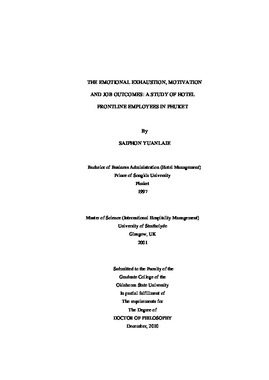| dc.contributor.advisor | Leong, Jerrold K. | |
| dc.contributor.author | Yuanlaie, Saiphon | |
| dc.date.accessioned | 2013-11-26T08:33:28Z | |
| dc.date.available | 2013-11-26T08:33:28Z | |
| dc.date.issued | 2010-12 | |
| dc.identifier.uri | https://hdl.handle.net/11244/7288 | |
| dc.description.abstract | Scope and Method of Study: The objectives of this study were 1) to study the relationship of emotional exhaustion, and motivation on frontline employees' job outcomes; 2) to identify the prior motivating factor for work of hotel frontline employee in Phuket. A cross-sectional sample survey was conducted. The target population was all hotel frontline employees in Phuket, Thailand, during the survey period. Data was analyzed using both univariate and multivariate techniques with SPSS and LISREL 8.5. Using LISREL 8.5, the Structural Equation Modeling (SEM) was employed to determine the causal relationship between predictor variable and to test the hypotheses to confirm the casual relationships. | |
| dc.description.abstract | Findings and Conclusions: Results indicate that job outcomes (job satisfaction, organizational commitment, job performance and turnover intension) of hotel frontline employee have casual relationships with motivation and emotional exhaustion. Both emotional exhaustion and motivation have a significant influence on job satisfaction and organizational commitment. Even though job satisfaction does not always lead to higher employees' perceived job performance, the organizational commitment still favorable affect job performance. For the top five of motivation factors of hotel frontline employees in Phuket, the study found that pay is the most value for hotel frontline employee, next job security, present co-worker, physical working condition and hotel recognition is ranking respectively. This finding suggests that it would be worthwhile for hotel managers to make greater concern in motivation and emotional exhaustion factors, in order to enhance job outcomes of hotel frontline employees. Additionally, the present study suggests that using multiple motivation theories which are better than focusing on one theory because the national culture plays an important role in determining the conditions for motivating people. | |
| dc.format | application/pdf | |
| dc.language | en_US | |
| dc.rights | Copyright is held by the author who has granted the Oklahoma State University Library the non-exclusive right to share this material in its institutional repository. Contact Digital Library Services at lib-dls@okstate.edu or 405-744-9161 for the permission policy on the use, reproduction or distribution of this material. | |
| dc.title | Emotional exhaustion, motivation and job outcomes: A study of hotel frontline employees in Phuket | |
| dc.contributor.committeeMember | Parakurthi, Radesh | |
| dc.contributor.committeeMember | Ryan, Bill | |
| dc.contributor.committeeMember | Ownbey, Shiretta F. | |
| osu.filename | Yuanlaie_okstate_0664D_11271.pdf | |
| osu.accesstype | Open Access | |
| dc.type.genre | Dissertation | |
| dc.type.material | Text | |
| dc.subject.keywords | emotional exhaustion | |
| dc.subject.keywords | job performance | |
| dc.subject.keywords | job satisfaction | |
| dc.subject.keywords | motivation | |
| dc.subject.keywords | organizational commitment | |
| dc.subject.keywords | turnover intension | |
| thesis.degree.discipline | Environmental Science | |
| thesis.degree.grantor | Oklahoma State University | |
